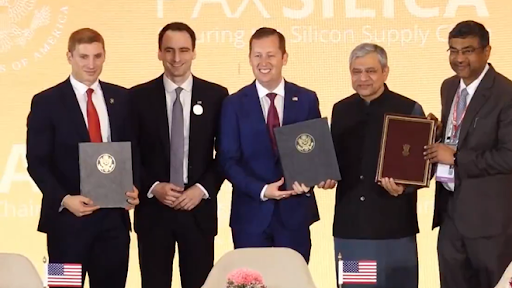Description
 Disclaimer: Copyright infringement is not intended.
Disclaimer: Copyright infringement is not intended.
Context:
- The 4th Joint Committee meeting for the review of AITIGA (ASEAN-India Trade in Goods Agreement) was held in Putrajaya, Malaysia.
Details:
- The Joint Committee undertaking the review work has met four times so far.
- The Committee finalised its Terms of Reference and the Negotiating Structure for the review negotiations in its first two meetings and initiated the negotiations for review of AITIGA from its third meeting held from 18-19 February 2024 in New Delhi.
- A total of 8 Sub-Committees have been constituted for dealing with different policy areas of the Agreement in the review and out of these, 5 Sub-Committees have started their discussions.
- All the 5 Sub-Committee reported the outcomes of their discussions to the 4th AITIGA Joint Committee.
- Four of these Sub-Committees dealing with ‘National Treatment and Market Access’, ‘Rules of Origin’, ‘Standards, Technical Regulations and Conformity Assessment Procedures’ and ‘Legal and Institutional Issues’ also met physically in Putrajaya, Malaysia alongside the 4th AITIGA Joint Committee.
- Both sides would next meet for the 5th Joint Committee meeting from 29-31 July 2024 in Jakarta, Indonesia.
|
ASEAN-India Trade relations
● India-ASEAN trade and investment relations have been growing steadily, with ASEAN being India's fourth largest trading partner.
● ASEAN is one of the major trade partners of India with a share of 11% in India’s global trade.
● The bilateral trade stood at USD 122.67 Bn during 2023-24.
● India's export to ASEAN stand at 11.28% of our total exports.
● Investment flows from ASEAN accounts for approximately 18.28% of investment flows into India since 2000.
● FDI inflows into India from ASEAN between April 2000 to March 2018 : US$68.91 billion.
● FDI outflows from India to ASEAN countries, from April 2007 to March 2015, as per data maintained by DEA : US$38.672 billion.
● The ASEAN-India Free Trade Area has been completed with the entering into force of the ASEAN-India Agreements on Trade in Service and Investments on 1 July 2015.
● ASEAN and India have been also working on enhancing private sector engagement. ASEAN India-Business Council (AIBC) was set up in March 2003 in Kuala Lumpur as a forum to bring key private sector players from India and the ASEAN countries on a single platform for business networking and sharing of ideas.
|
Challenges in India-Asean Relations:
1. Indo-Pacific Rivalry:
- Earlier, China was seen as the main economic partner and the US as the primary security protector for ASEAN.
- This balance is now breaking, especially due to the Russia-Ukraine conflict, causing more tension in the region.
- The competition between major powers in the Indo-Pacific is risking the stability that helped the region grow.
2. Unstable Geoeconomics:
- Geopolitical tensions in the Indo-Pacific are causing economic problems, like trade issues and supply chain difficulties.
- ASEAN is not united on how to handle these problems, making it harder to find solutions.
3. India-ASEAN Challenge:
- Many agreements between India and ASEAN nations are not finalized yet, which is slowing down economic relations.
- Even though India is working on projects like the India-Myanmar-Thailand highway, they are not finished. In contrast, China's Belt and Road Initiative is becoming popular in some ASEAN countries.

4. Trade Issues:
- India's trade with ASEAN is not growing fast, and there's a big difference between what India buys from ASEAN and what it sells.
- Rules like where products come from, customs procedures, and health measures are causing problems. India also faces barriers for its professionals to work in ASEAN.
5. Investment Challenges:
- It's hard for investors and businesses from both regions to work smoothly because of visa rules, work permits, and how businesses are run.
- ASEAN is not happy with India's 2020 CAROTAR rules, adding to the difficulties in investment and trade.
Conclusion:
- The Indo-Pacific rivalry is shifting, causing instability in economic and security relationships within ASEAN. Geopolitical tensions are impacting trade and technology cooperation, while internal divisions within ASEAN complicate problem-solving. India faces challenges in finalizing deals and completing connectivity projects, leading to a growing trade deficit with ASEAN. Barriers like non-tariff measures and investment complexities hinder smooth economic relations. These challenges highlight the need for strategic cooperation and diplomatic efforts to navigate the evolving dynamics in the region. The upgradation of AITIGA will further boost bilateral trade.
Important article
https://www.mea.gov.in/Portal/ForeignRelation/India-ASEAN-Relations-August-2018.pdf
Source:
https://pib.gov.in/PressReleasePage.aspx?PRID=2020351
|
PRACTICE QUESTION
Q.India-ASEAN trade and investment relations have been growing steadily, with ASEAN being India's fourth largest trading partner. However the economic relationship has faced many challenges in recent times. Critically Analyse. (250Words)
|





 Disclaimer: Copyright infringement is not intended.
Disclaimer: Copyright infringement is not intended.


